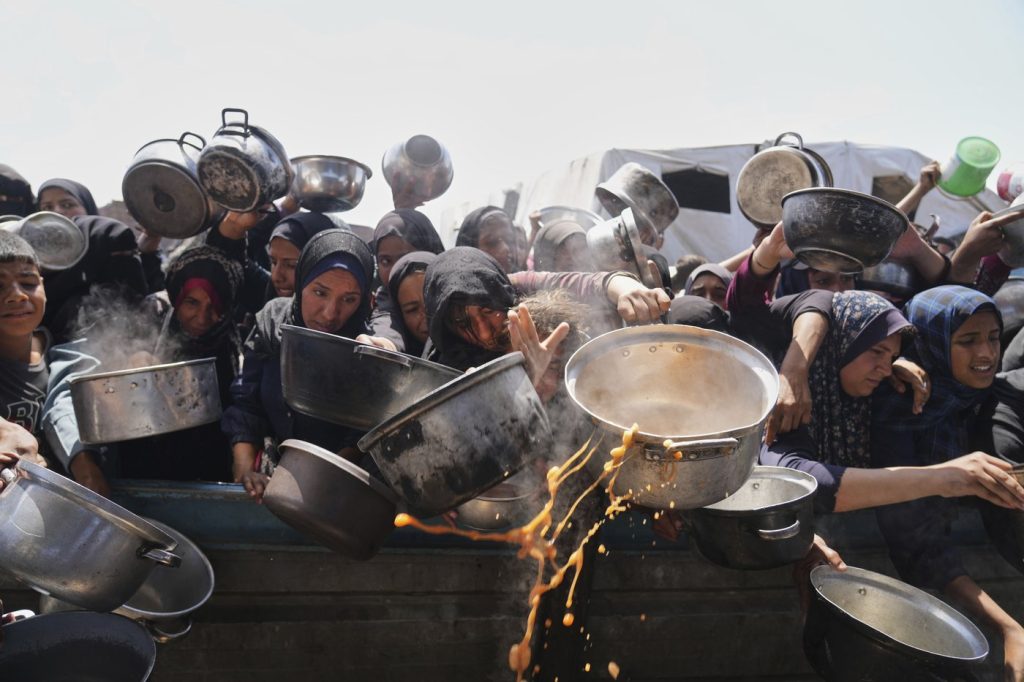DEIR AL-BALAH, Gaza Strip (AP) – An Israeli initiative to seize control of the Gaza Strip and extend military operations has raised significant concerns within the region. The situation for Palestinians has become dire, with many feeling exhausted and hopeless after enduring 19 months of intense bombing. There is growing anxiety among families of Israeli hostages still held in Gaza, who fear that the prospect of a ceasefire is diminishing rapidly.
"What’s left for you to bomb?" questioned Moaz Kahlout, a displaced Gaza City resident, who noted that many now rely on GPS to navigate through the rubble of homes destroyed in the ongoing conflict.
Israeli officials announced on Monday that Cabinet ministers had approved a plan to take over Gaza and remain in the territory indefinitely, coinciding with the military chief's directive that tens of thousands of reserve soldiers were being called up. While the specifics of the plan have not been formally disclosed, it remains unclear when or how it will be implemented. This strategic move may serve as a pressure tactic against Hamas during ongoing ceasefire negotiations.
The conflict ignited after Hamas-led militants launched an attack on southern Israel on October 7, 2023, resulting in the deaths of approximately 1,200 people, primarily civilians, and the abduction of 251 individuals. According to Israeli sources, 59 captives remain in Gaza, with around 35 believed to be deceased.
In response to the Israeli offensive, which has reportedly claimed the lives of over 52,000 people in Gaza—many of whom are women and children—Palestinian health officials emphasize that their casualty counts do not differentiate between combatants and civilians. Enshirah Bahloul, a woman from Khan Younis, expressed the despair felt by many, stating, "They destroyed us, displaced us and killed us. We want safety and peace in this world. We do not want to remain homeless, hungry, and thirsty."
Some Israelis have voiced opposition to the new military strategy, with hundreds demonstrating outside the parliament as the government convened for its summer session. Concerns are particularly high among families of hostages, who fear the implications of an expanded military operation.
Adi Alexander, whose son Edan was captured during the October 7 attack, voiced his skepticism regarding the proposed escalation, stating, "I don’t see the expansion of the war as a solution – it led us absolutely nowhere before. It feels like déjà vu from a year ago." Alexander remains hopeful about the upcoming visit of U.S. President Donald Trump to the Middle East, as Israeli leaders have indicated they do not plan to initiate an expansion in Gaza until after the visit.
Moshe Lavi, related to the oldest hostage presumed alive, expressed apprehensions about the plan. "We hope it’s merely a signal to Hamas that Israel is serious in its goal to dismantle its governmental and military capabilities, but it’s unclear whether this is an end or a means," he remarked.
Each day, numerous Palestinians wait outside a charity kitchen in southern Gaza that serves hot meals to displaced families. Children push forward with pots and buckets in desperate attempts to secure food for their loved ones. "What should we do?" asked Sara Younis, a resident of Rafah, as she awaited a meal for her children. "There’s no food, no flour, nothing."
In early March, Israel implemented a blockade on all imports into Gaza, resulting in severe shortages of food, medicine, and other essential supplies, with the stated objective of compelling Hamas to release the remaining hostages. Humanitarian organizations warn that the prevalence of malnutrition and hunger is escalating, noting that the vast majority of the Gazan population now relies on aid.
Concerns are mounting among aid groups that the progress made earlier this year in averting famine is rapidly diminishing. Tikeya, like many organizations in Gaza, has run out of most food supplies, resorting to cooking nearly exclusively pasta for the past two weeks.
Nidal Abu Helal, who works at a charity and is himself displaced, expressed alarm over the risk of starvation facing the population. "We’re not afraid of dying from missiles; we’re afraid that our children will die of hunger in front of us," he lamented.











